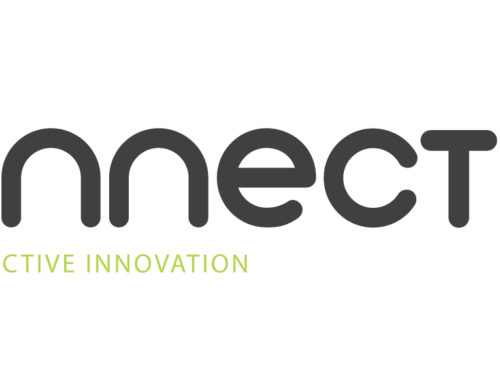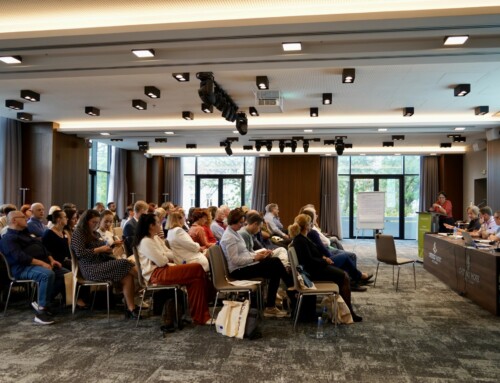The Hungarian National Consultancy Centre held a professional online conference entitled The role of advisors in knowledge sharing, focusing on the European Advisory Services Database and the good practice of interactive innovation organized by NAK-OSZK in Budapest (Hungarian Chamber of Agriculture – National Consultancy Center).
The professional meeting about the role of advisors in knowledge sharing, the presentation of European trends through the H2020 and Erasmus+ projects was held online on 17 June 2021.
The event focussed on the European Database of Advisory Services, which is now being launched in the i2connect project, and the collection of good practices promoting interactive innovation.
The event was opened by Zsuzsanna Varga, group leader of NAK National Coordination Centre of Advisory Centres. In her greeting speech, she outlined the new trends related to the topic and presented the tasks and staff of OSZK.
The lectures began with the presentation of the 5-year project i2connect (Networking of Advisors to Promote Interactive Innovation in Agriculture and Forestry). The main goal of this H2020 project is that advisors involved in interactive innovation processes recognize farmers’ need for development and bring them together with actors “operating” on a similar topic to find a common solution, thus becoming a key player in the Agricultural Knowledge Sharing and Innovation System (AKIS). Thus, the results of the project will be utilized at the level of farmers through advisors as intermediaries. Interactive innovation includes already existing knowledge, which is not limited to scientific or classroom knowledge. It is characterized by the sharing and flow of knowledge, as well as by effective mediation and cooperation between the actors along the value chain and in different sectors. The key is already existing knowledge. This existing knowledge is used by end-users and practitioners for solutions or to develop a particular opportunity. The specific objective of the project is to develop the skills, competencies, attitudes, and work culture of the advisors, as well as to identify and share best practices within the network and to develop tools and methods for all this. During the presentation, the starting European Database of Advisory Services was highlighted (Registration here), which is a directory of advisors and advisory organizations covering Europe, i.e. those who provide knowledge services to agricultural actors. The project owner is NAK and the presentation was given by Ágnes Jakab, project manager.
The lecture series continued with a description of the currently running WP2 work package of i2c entitled “Introducing the WP2 Work Package of the i2connect Project”. Wageningen Economic Research is responsible for the work package and the project was presented by researcher Dóra Lakner.
The work package undertakes to gather good practices across Europe. The role of the advisor is to create a space in which the actors involved are able and willing to work together and seek common solutions (co-creation). In this phase of the project, the specific goal is to collect 300 practical innovation cases, as well as to analyse 40 such practical cases, and develop guidelines for their implementation. 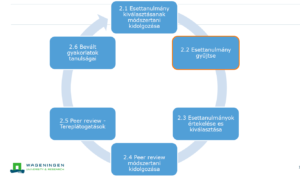
Flowchart of the i2c WP2 work package (Source: Wageningen University, presentation by Dóra Lakner)
In order to achieve the objectives set, a competition was announced among advisors to find the best practice case for supporting innovation. Accordingly, they are looking for agricultural advisers, village agronomists and forestry managers who have success stories and would be happy to share them with the researchers. The call seeks innovative technologies as well as inspiring initiatives to learn about the role of advisors in interactive innovation i2c goals. In the competition, the existing practical knowledge of the advisors will be tested, especially for the so-called multi-actor (i.e. farmers, researchers, teachers/trainers, etc.) collaborations. The deadline for submitting applications is 30 June 2021, but interactive innovations are constantly expected in the project even after the deadline. (Available here: interactive innovation through advisors; i2connect Questions and instructions for completing in practical cases)
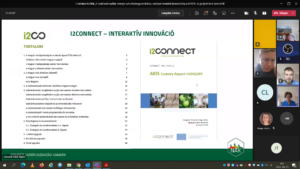
i2c WP1.2 Hungarian AKIS report (Source: Ágnes Jakab i2c presentation)
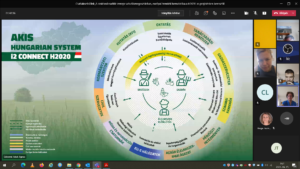
i2c WP1.2 Hungarian AKIS report – AKIS system (Source: Ágnes Jakab i2c presentation)
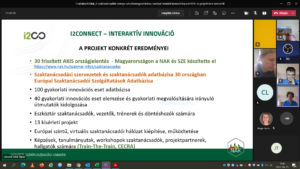
i2c planned goals (Ágnes Jakab i2c presentation)
The online event was an excellent opportunity for advisors to gain a deeper insight into the news of the H2020 projects, with a particular focus on i2connect, the opportunities offered by the project. On the Hungarian side, the implementation of the results of the project is assisted by Dr. András Vér, research associate (MATE Széchenyi István University, Faculty of Mosonmagyaróvár) and Dr. László Papócsi, leader of the advisors’ team (Research Institute of Organic Agriculture).
by Ágnes Jakab, NAK
Dóra Lakner pic:
2.1 Methodological development of the selection of case studies
2.2 Collection of case studies
2.3 Evaluation and selection of case studies
2.4 Methodological development of the peer review
2.5 Peer review – field visits
2.6 Lessons learned from best practices
